FW
Pact Organic’s products aren’t just good for the planet and workers. They're much softer and they fit better.
Pact Organic works with fair trade manufacturing facilities in India, and its cotton comes from India, a fair trade cotton intervention program that works with small and marginal farmers to grow organic cotton and to help make farming a sustainable and profitable occupation for them.
Conventional cotton uses about 16 per cent of the world's insecticides and seven per cent of pesticides and approximately 20 per cent of the world's industrial water pollution comes from the treatment and dyeing of textiles. The apparel and textile industries also struggle with issues related to child labor and poor working conditions.
Pact Organic is on a mission to change all of that: It's transforming the way apparel is made by focusing on the people who make clothes and the planet. Pact Cotton uses super soft cotton for its women's leggings, baby, toddler and women's and men's lounge and sleep wear.
Pact Organic hit revenues of about 15 million dollars to 20 million dollars at retail, and this year it expects sales to reach 25 million dollars to 30 million dollars.
Cambodia's economic growth is expected at seven per cent in 2017.This will be driven by garment export, construction, tourism and agriculture. With the expected growth, the country's gross domestic product will reach about 22 billion dollars.
Garment exports and construction are forecast to grow by ten per cent and 14 per cent respectively in 2017. Tourism is projected to see strong growth based on the 12 per cent rise in tourist arrivals during the first four months of this year. Cambodia has achieved robust economic growth of 7.7 per cent annually in the last two decades coupled with low and manageable inflation as well as a stable exchange rate.
One of the main challenges to Cambodia’s economy is dollarization. Despite its benefits, dollarization exposes the economy to risks and losses, and especially imposes constraints on monetary policy implementation. Foreign currencies, comprising mainly dollars, accounted for 83 per cent of cash and bank deposits in Cambodia at the end of 2015, up from 56 per cent in 1995.
Continued interest rate hikes in the US may weaken prospects of further capital inflows to Cambodia. Any disruption in global trade flows will have substantial negative impacts on Cambodia, given its high level of dependence on exports, particularly garments and footwear, as one of the main drivers of economic growth.
Alibaba Gateway was held in the US, June 21 to 22, 2017. This is the largest event Alibaba has hosted outside of China. More than 3000 people participated. The event covered many success stories of merchants selling on Alibaba’s platforms in different categories with sessions detailing how Alibaba can help more American businesses sell on its platform.
Speakers at the conference discussed about the significant demand for American goods in China. Overall, US goods are ranked as the third most popular items on Alibaba’s e-commerce platforms after goods from Japan and South Korea.
Chinese consumers generally prefer American brands, as they believe they represent premium quality and better design. This was the takeaway from Alibaba Gateway ’17. The international conference helped small-to-medium-sized businesses in US understand the opportunity in China and sell their products in China via Alibaba’s various platforms.
The conference highlighted that the market potential for the fashion category is expected to be driven by rising demand from the lower tier cities of China. The market size for fashion in China is projected to reach 195 billion dollars in five years. There are currently 102 cities in China with a population of over one million. The combined spending power of the lower tier cities is estimated to equal the four tier one cities—Beijing, Shanghai, Guangzhou and Shenzhen.
"Birla Cellulose becomes one of the first viscose staple fibre producers to earn the US Department of Agriculture (USDA) Certified Biobased Product label for its products as well as to complete the audit conducted by the Rainforest Alliance. As in recent years, fashion as an industry is blamed to have emerged as a rapidly growing sector using forests for fabrics such as viscose, modal, lyocell and other trademarked textiles by destroying vibrant forest ecosystems, those are critical for maintaining species diversity, a stable climate and freshwater systems."

Birla Cellulose becomes one of the first viscose staple fibre producers to earn the US Department of Agriculture (USDA) Certified Biobased Product label for its products as well as to complete the audit conducted by the Rainforest Alliance. As in recent years, fashion as an industry is blamed to have emerged as a rapidly growing sector using forests for fabrics such as viscose, modal, lyocell and other trademarked textiles by destroying vibrant forest ecosystems, those are critical for maintaining species diversity, a stable climate and freshwater systems. “We applaud Grasim Industries Ltd., for earning the USDA Certified Biobased Product label," said Kate Lewis, USDA BioPreferred Program. “Products from Grasim Industries Ltd., are contributing to an ever-expanding marketplace that adds value to renewable agriculture commodities, creates jobs in rural communities, and decreases our reliance on petroleum.”

“This audit of Birla Cellulose’s current supply chains confirms that the risk of sourcing wood from ancient and endangered forests or other controversial sources is low risk, which is an industry leading result. Congratulations to Birla Cellulose, who today, have taken a significant step forward in fulfilling thecompany’s CanopyStyle commitments with the release of these industry-leading audit results”, said Nicole Rycroft, Canopy’s Executive Director. “These audits are a key milestone on the CanopyStyle path to ending the use of endangered forests in fabric and a critical tool for Canopy and our 100 brand partners in assessing risk and tracking innovation within the rayon - viscose supply chain.”
Birla Cellulose , part of Grasim Industries Ltd, is a flagship company of Aditya Birla Group, that has– Birla Viscose, Birla Modal & Birla Excel as its products.
The need of the hour
Progressing conservation solutions that benefit local communities, species, the world’s climate and intact forests are drivers behind the work of Canopy and the Rainforest Alliance. “Birla Cellulose announced our wood sourcing policy with Canopy just over two years ago to reinforce our company’s long-standing commitment to sustainability and responsible sourcing. The verification audit confirms the sustainability and transparency of our certified wood and pulp sourcing,” said Dilip Gaur, Business Director, Aditya Birla Group, Pulp and Fibre. “We welcome the CanopyStyle Audit assessment and look forward to further strengthening our performance. We will continue to invest in new technology to support our long-term focus of reducing our environmental footprint, and continuing transparency to our customers”. Rajeev Gopal, Chief Marketing Officer, Birla Cellulose, further said, “This certification reconfirms the natural origin of our products & will enhance the confidence of the value chain players in delivering biobased products.”
The significance of the process
Third-party verification for a product's biobased content is administered through the USDA BioPreferred Programme. One of the goals of the BioPreferred Program is to increase the development, purchase and use of biobased products. The USDA Certified Biobased Product label displays a product's biobased content, which is the portion of a product that comes from a renewable source, such as plant, animal, marine, or forestry feedstocks. Utilising renewable, biobased materials displaces the need for non-renewable petroleum based chemicals. Biobased products, through petroleum displacement, have played an increasingly important role in reducing greenhouse gas emissions that exacerbate global climate change. Biobased products are cost-comparative, readily available, and perform as well as or better than their conventional counterparts.
Key results of the audit
Key findings of Birla Cellulose’s audit include:
• Current Birla Cellulose fibre supply chains are confirmed as low risk for sourcing from ancient and endangered forests or other controversial sources
• A comprehensive understanding of their supply chain structure and the geography of all dissolving wood pulp manufacturers
• A strong commitment to the company policy to avoid sourcing from ancient and endangered forests.
Improving sustainability from Forest to Fashion
Moving forward, the company intends to further improve sustainability from Forest to Fashion by undertaking steps including:
• Continue to advance research and development on new technologies of recycled and alternate fibres
• Support conservation solutions in the world’s ancient and endangered forests
• Ensure all Birla Cellulose owned mills and its wood suppliers continue to maintain their own independent 3rd party certification systems
• Build on Birla Cellulose’s existing chain of custody systems and certified material sources.
These audits are a key tool to support improved performance on these commitments and are conducted annually. Audit findings contribute to CanopyStyle’s Hot Button Issue Report, which assesses viscose producers’ overall performance on forest conservation, advancements on developing fabrics made from recycled fabrics and alternative fibres, and sourcing transparency.
"The Goods & Services Tax (GST) Council announced rates for the textile and other pending categories on June 3, 2017, moving one step closer to the proposed implementation of the new tax regime with effect from July 1, 2017. While rates for most commodities were announced on May 19, 2017, the announcement for the textile sector came with a lag owing to the complexities involved in the textile value chain, given the multiple layers and considerations as well as its far-reaching implications on the country’s output and employment."
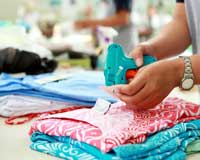
The Goods & Services Tax (GST) Council announced rates for the textile and other pending categories on June 3, 2017, moving one step closer to the proposed implementation of the new tax regime with effect from July 1, 2017. While rates for most commodities were announced on May 19, 2017, the announcement for the textile sector came with a lag owing to the complexities involved in the textile value chain, given the multiple layers and considerations as well as its far-reaching implications on the country’s output and employment.
Some of the industry characteristics which add to the complexity include: regionally spread-out textile value chain and variations in state-level taxes and subsidy regimes; variation in taxation rates for fibres viz. natural vis-à-vis man-made; large interactions between organised and unorganised segments, which are subject to different taxes and rebates/subsidies; and variations in tax incidence and exemptions across segments in the value chain. Overall, the rates announced for the textile sector are comparable to the current effective tax rates for most categories and more or less in line with the industry expectations, except for manmade fibres and yarns, where the industry participants were hoping for a movement towards a fibre-neutral regime.
Existing Tax Structure: Low effective taxation at present

Given the importance of the textile industry in terms of employment generation and contribution to foreign currency earnings, the Indian textile industry has been supported through low taxation, capital and interest subsidies and refund of taxes paid on inputs through the duty drawback scheme for exporters. Further, most of the players across the value chain operate on the optional route and pay zero excise duty provided they don’t claim the Input Tax Credit (ITC), thereby resulting in the incidence of lower duty. Some of the key reasons for players opting for the optional route include: non-availability of ITC for cotton-based companies, given no excise on cotton: Domestic spinning industry is largely cotton-based which is not subject to excise, and hence ITC on raw materials is not available; non-availability of ITC for downstream companies, given low tax incidence for fabric manufacturers: The weaving industry is dominated by the small scale industries (SSIs), which operate under the composite scheme for taxation. As a result, ITC is not available for the downstream sectors.
With the exception of man-made fibres, the GST rates for all input categories viz. cotton, silk, jute, wool as well as other natural fibres have been kept in the Nil/lowest tax slab of 5 per cent up to the fabric-making stage. In the downstream segment of end-product manufacturing, multiple rates have been introduced varying across product categories as well as across price-points. Further, the rates announced for the MMF based products follow an inverted duty structure wherein the raw materials have been subjected to taxation at higher rates.
Impact likely to be neutral
As per ICRA’s estimates, the effective tax incidence on cotton and MMF/blended textiles (up to fabric stage) under the existing tax regime is in the range of 5-7 per cent and 11-14 per cent respectively. Besides excise duty, this captures the impact of other multiple levies such as Value Added Tax (VAT), Central Sales Tax (CST) and Entry Tax/ Octroi. Considering that the GST rates announced for these textile categories are more or less in line with the existing effective tax rates, ICRA does not envisage any impact on these product categories. However, the rates announced are expected to be positive for wool/silk-based textiles which will be taxed at a lower rate of 5 per cent vis-à-vis their prevailing tax incidence of ~8-10 per cent.
The fabric manufacturers, which operate under the composition scheme of taxation for which ITC is not available, will face challenges as the apparel manufactures will prefer to deal with GST-compliant fabric suppliers to avail of the ITC. This will hence incentivise the fabric manufactures to operate under the purview of GST. Further, with the GST applied on cotton yarn as well, the incentive for fabric manufacturers to not avail of the ITC will also fall since doing so would reduce the fabric manufacturers’ competitiveness.
Though the impact is unlikely to be substantial up to the fabric stage, differential rates for the apparels based on pricing points is likely to create some impact on the apparel-manufacturers. While the impact is likely to be positive for apparels priced at less than Rs1,000/ piece in terms of reduced tax liability, the impact is likely to be marginally negative to negative for costlier apparels priced at more than Rs1,000 per piece.
"Hong Kong’s export sentiment has reached a four-year high, according to the latest Hong Kong Trade Development Council (HKTDC) Export Index. For the second consecutive quarter the Index rose, climbing to 50.1 during the April-to-June period. The figure registered 47.1 in the first quarter of the year. The results are the first time since the second quarter of 2013 to surpass the 50 mark, reflecting positive sentiment among local exporters. The Export Index gauges exporter confidence, with a reading below 50 signaling a contraction in Hong Kong exports over the short-term."
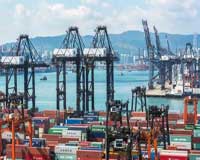
Hong Kong’s export sentiment has reached a four-year high, according to the latest Hong Kong Trade Development Council (HKTDC) Export Index. For the second consecutive quarter the Index rose, climbing to 50.1 during the April-to-June period. The figure registered 47.1 in the first quarter of the year. The results are the first time since the second quarter of 2013 to surpass the 50 mark, reflecting positive sentiment among local exporters. The Export Index gauges exporter confidence, with a reading below 50 signaling a contraction in Hong Kong exports over the short-term.
However, export growth is expected to moderate in the second half of 2017 due to a higher comparison base, and could be further impacted by major downside risks, including protectionist pressures in the United States, political uncertainties in the European Union, and heightened geopolitical tensions.
Exports index to China, EU up, Japan, US declined
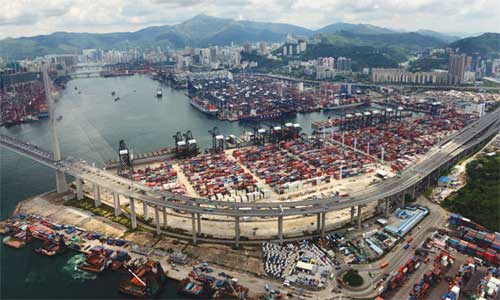
Among individual markets, China surpassed the United States and Japan as the most promising market for local traders. The index for the Chinese mainland market registered 51.9, with the EU up slightly at 49.6, while the index for Japan and the US declined.
Helped by a low comparison base and faster recovery of the global economy, Hong Kong's export performance has so far been above expectations, says HKTDC Principal Economist (Global Research) Daniel Poon. In the first four months of 2014, Hong Kong exports to the US rose 1.3 per cent, those to the EU were up three per cent, and those to Japan increased 5.3 per cent. While Hong Kong exporters are advised to intensify their sales efforts to capitalise on growing opportunities in the developed world, they should not overlook emerging economies, which are expected to continue to do well over the medium term.
Apparel export positive, but clouded by competition
Although China is experiencing slower growth in the midst of economic restructuring, Hong Kong exports to the mainland and ASEAN grew 10.3 per cent and 8.6 per cent respectively. Poon expected a brighter outlook for several industries for an optimistic prospects for overall exports including clothing, which is improving as a global trade environment and should stimulate sales, but prospects will be clouded by continued competition from neighbouring countries such as Vietnam, Cambodia, Myanmar and Bangladesh.
Hong Kong manufacturers looking to relocate or diversify their mainland production base should consider the Philippines as an alternative location. According to Dickson Ho, HKTDC Principal Economist (Asian and Emerging Markets), the country’s skilled workforce and burgeoning retail market offer both manufacturing and sales opportunities.
As a manufacturing base, the Philippines, enjoys a distinct edge compared with other relocation hotspots in Southeast Asia, with its English-speaking workers, who are both skilled and trainable, this presents an attractive option for foreign investors confronted with the challenge of labour management and training in alternative production bases, says Ho.
During a recent trip to Manila, HKTDC Research team found that businesses were optimistic about the country's future development. Ho says that they were generally supportive of the government's economic policy and believed President Rodrigo Duterte's strong government could better tackle the long-standing problems of red tape and bureaucracy in the Philippines.
"To sustain its export-driven economy and minimise the impact of US withdrawal from the TPP, Vietnam is placing a great thrust on the increased trade relations with the US, which is its largest export market. Vietnam and the US have recently signed business deals worth US$8 billion, in the sectors such as aircraft engines and development of power generation capabilities, along with hospitality, science and technology, academia and energy."
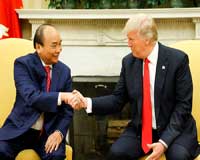
To sustain its export-driven economy and minimise the impact of US withdrawal from the TPP, Vietnam is placing a great thrust on the increased trade relations with the US, which is its largest export market. Vietnam and the US have recently signed business deals worth US$8 billion, in the sectors such as aircraft engines and development of power generation capabilities, along with hospitality, science and technology, academia and energy. The trade tie is expected to generate 23,000 American jobs and help in reducing the US trade deficit with Vietnam, which stood at almost US$32 billion in 2016.
Trade stats
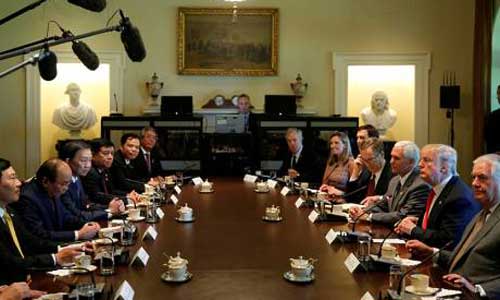
Trade between the two countries has been witnessing 20 percent growth annually since 2001, with 2016 trade reaching US$47 billion – 33.5 times higher than 2001 figures. Vietnam is US’s 16thlargest trade partner and the fastest-growing market for US exports. Trade between the two nations is however tilted towards Vietnam. In 2016 and 2015, Vietnam’s trade surplus stood at US$32 billion and US$31 billion respectively. In the first four months of 2017, US accounted for 20 percent of Vietnam’s exports, an increase of 8.7 percent from the same period last year. Major export items included textile-garment, footwear, computers, seafood, farm products, timber and timber products, electronics and components.
Deals sealed in 2017
In the recent exchange, deals worth U$8 billion were signed between the two countries. General Electric signed its largest single combined sale with the country worth US$5.58 billion for power generation, aircraft engines, and services. The agreement includes 20 jet engines made by CFM International, a joint venture of GE and Safran for VietJet Aviation. Also included is a 12-year engine service contract for 100 Boeing 737 MAX aircraft that VietJet has ordered. VietJet also signed a US$1 billion deal with GE Capital Aviation Services for aircraft financing.
In the power sector, GE signed an MoU to build two 750-megawatt gas-fired turbine power plants in conjunction with state energy group Petro Vietnam. The deal also included joint development agreement for an 800-megawatt wind power facility. Caterpillar and its Vietnam subsidiary agreed to provide generator management technology for more than 100 generators in Vietnam. The remaining deals focused on hospitality, science and technology, academia and energy.
TPP without the US
As is the known fact that Vietnam would have been one of the major beneficiaries of the original TPP’s reduced tariffs. TPP including US would have led to an increase in US investments and help Vietnam position itself as a viable alternative to China for low-cost manufacturing. However, with the new US administration favouring bilateral trade deals rather than multilateral, few TPP member countries are pushing to revive the agreement without the US.
Vietnam had brought in changes in state-owned enterprises and deregulated key sectors such as finance, telecommunications, and retail to gain increased access to the US market. Even without the US, Vietnam believes that a renegotiated TPP will be feasible as TPP focused not only on market access, but also on labour reforms, transparency, IP protection, and anticorruption, which would help modernise its economy. The country will also benefit from increased market access in new members and a deeper integration in global supply chains. TPP11 will allow member states reduce their dependence on China, which backs the Regional Comprehensive Economic Partnership (RCEP), which is a 16-nation trade pact that includes the Association of Southeast Asian Nations (ASEAN), along with China, Australia, India, Japan, South Korea, and New Zealand.
Trade outlook
Trade experts predict exports to grow over 13 percent in 2017 driven by acceleration in global trade and higher import of raw materials and electronic parts. Largest export markets will continue to be the US, EU, China, and Japan accounting for 22 percent, 18 percent, 12 percent, and 8 percent respectively of total exports.
Export revenues of Vietnam’s textile and garment industry are forecast to go up 11 per cent over the previous year. Such a number if realized will account for 16 per cent of the country’s total outbound sales.
Vietnam, one of the five largest textile and garment exporters in the world, got 28.3 billion dollars in outbound sales last year. The added value was still not high as local content in its apparel products was just over 50 per cent.
The domestic sector is strong in export outsourcing but weak in weaving and dyeing. Only a small number of Vietnamese enterprises are well-qualified to enter global supply chains. Supporting industries for the local textile and garment sector have remained underdeveloped. It is now facing a lack of skilled workers while its input costs are high and loan interest rates are higher than in other regional countries.
Vietnamese textile and garment products are up against fierce competition with those from other countries, especially China, because in addition to quality, price and delivery time, domestic exporters have to meet strict environmental protection requirements.
Therefore, local manufacturers have had to replace old equipment to meet four key criteria – productivity, quality, energy saving and environmental protection.
Burberry’s chairman Sir John Peace is planning to leave. Peace has been chairman of the luxury fashion retailer since 2002.
A successor will be announced by the end of 2018. Meanwhile Christopher Bailey, who had been combining the role of chief executive and chief creative officer, will step aside and become president of the iconic British brand.
It is not clear whether the departure of 68-year-old Peace from Burberry will mark the end of a long career in the boardrooms of some of the UK’s biggest companies. At one point, he chaired three major businesses – Burberry, the credit-checking company Experian and Standard Chartered bank.
Marco Gobbetti will become chief executive next month after being recruited from French luxury rival Céline. His appointment is one of a number of senior management changes at the company, which recently hired Julie Brown from the medical supplies group Smith & Nephew as chief operating officer and chief financial officer.
Founded in 1856, Burberry is a global luxury brand with a distinctive British identity manufacturing clothing, fragrance and accessories. It is known for its iconic trench coat, sweaters, jackets, backpacks, and the unique and recognizable tartan pattern. The brand has a heritage of innovation, craftsmanship and design.
Advanced Functional Fabrics of America (AFFOA) a public-private partnership that began at MIT, has officially opened its headquarters in Cambridge. CEO Yoel Fink at the headquarters’ opening ceremony stated that a new high-tech fabric center has actually developed that technology and fabrics those convey the identity as individuals and our values as a society.
The Cambridge headquarters has space for startups, workforce development and product prototyping.The $10 million center is located near MIT, which last year founded AFFOA after the federal government tapped Massachusetts to lead a national textile manufacturing innovation institute. Other centers are also planned.
The centre looks like a gigantic laboratory inside. The walls are white with floor-to-ceiling glass partitions. Twenty-foot-tall machines spit out long tiny fibers. Those fibers go on a spool. Think of it as high-tech yarn spinning.
The space will have three main functions a startup incubator and provide tools and guidance to emerging companies, other to focus on education and opportunities for students to get involved in this emerging field. AFFOA is collaborating not only with startups, but also with universities both in the commonwealth and across the country, from UMass Lowell to Drexel University to the University of Texas at Austin and more. The institution is also working with large-scale companies, like Boston’s own New Balance.
To Fink, who is also a professor of materials science and engineering at MIT, fabric is “the new software.” The big idea here is to develop fabrics that provide services.
The invention AFFOA unveiled is a backpack made out of fabric that allows people to upload photos, videos or other information into it using an app called AFFOA Looks. Someone else with the same app can then hold their phone up, scan the backpack and pull up what the backpack owner has uploaded. It works sort of like a QR code.
It's like having a social media platform embedded into fabric. There could also potentially be some advertising and marketing applications.












